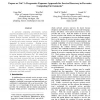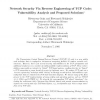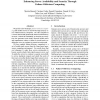55 search results - page 3 / 11 » Computer security impaired by legitimate users |
CORR
2010
Springer
13 years 4 months ago
2010
Springer
This paper introduced NgViz, a tool that examines DNS traffic and shows anomalies in n-gram frequencies. This is accomplished by comparing input files against a fingerprint of leg...
CHI
2006
ACM
14 years 6 months ago
2006
ACM
Security toolbars in a web browser show security-related information about a website to help users detect phishing attacks. Because the toolbars are designed for humans to use, th...
PERCOM
2005
ACM
14 years 5 months ago
2005
ACM
In pervasive computing environments, service discovery facilitates users to access network services by automating tedious manual configurations. When network services becomes perv...
INFOCOM
1996
IEEE
13 years 10 months ago
1996
IEEE
The Transmission Control Protocol Internet Protocol TCP IP 1 suite is a very widely used technique that is employed to interconnect computing facilities in modern network environm...
OSDI
2004
ACM
14 years 6 months ago
2004
ACM
We present a new technique, failure-oblivious computing, that enables servers to execute through memory errors without memory corruption. Our safe compiler for C inserts checks th...



